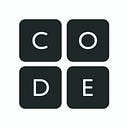New CS Principles curriculum encourages more creativity, more advanced programming and focus on ethics
Over the past two years we have been hard at work revamping and improving our CS Principles course. As with every curriculum project, our team relied on our Curriculum Values to lay out our vision of an idealized classroom environment and how we can create tools and lessons to achieve that vision. Now, we are proud to unveil our brand new CS Principles 20–21 course.
We challenged ourselves to develop a new course that could support more independent creation from students, expose them to more advanced programming concepts, and enable deeper discussions about the global impact of new technologies like artificial intelligence. On top of that, we wanted to structure the course to make it easier for educators to teach the material.
And we continued to gather feedback from thousands of teachers in classrooms across the country who told us what they loved — and what could be better — about the course.
Here’s more about what you can expect from CS Principles 2020–21:
More creativity + collaboration in the classroom
We’ve taken teachers’ favorite elements from the original CS Principles curriculum — which created an engaging, collaborative classroom atmosphere — and made them even better in CS Principles 2020–21.
As one example, our App Lab tool now offers dozens of Themes that provide a quick and easy way to add color and style to an entire app without needing to laboriously change the settings for every element. We hope this change will help students better achieve their creative ideas, whether working alone on a project or in groups.
You can read more about new app lab features here.
As another example, in our final unit, students collaborate in an engaging simulation where they each take on the role of a school stakeholder. It could be a parent, a student, an administrator, or even the bus driver! With their group, students research computing innovations, consider different viewpoints, and present a proposal at the simulated “Future School Convention” for the best innovation to improve schools.
Aspects of the curriculum that are best-loved by our teachers and students are still here. For example: classroom discussions still follow a Think-Pair-Share pattern, which means student collaboration is core to these lessons. We strive to include group projects in which everyone plays a critical role.
Foundational learning and AP exam preparation
Computer Science is foundational learning for all students, and CS Principles enables students to see how computer science is applicable in their everyday lives and the world they live in. At the same time, CS Principles 20–21 covers the content students need to be successful on the updated AP Computer Science Principles exam. To better support students and teachers, we have rearranged units so that students learn the content needed for the Create Performance Task well before the deadline for submitting the task.
We have also put greater emphasis on programming topics such as functions with parameters, functions with a return, and using lists, which will be needed for the new Create Performance Task. In addition to supporting students’ work on the Create Performance Task, these changes allow students more time to build skills and gain confidence in their programming abilities.
Contemporary topics such as AI, machine learning, data, and ethics
There are deeper lessons on data analysis, artificial intelligence and machine learning, and the ethical issues surrounding those concepts. We’ve completely revamped the data unit — which now uses real world data — to help students better understand the connection between computer science and their daily lives, and to motivate them to continue studying the subject.
We added lessons that encourage students to think about computer science comprehensively. Students explore ethical concerns surrounding new technologies, how those technologies could impact or disproportionately affect different identities or groups of people, and how to build technologies that incorporate the issues and needs of many different people from diverse backgrounds.
New pedagogy and approach to learning
For teachers, we’ve improved the curriculum format to make it easier to use and adapt. Our hope is that teachers will be able to more easily master the lesson format and framework, and then feel comfortable improvising and adapting the material to best fit the needs of their students. Even more than before, this new curriculum centers teachers as the experts of their own classroom.
All lessons are now 45 minutes and have a consistent unit structure for easier planning, as well as more clarity on pedagogy through our new EIPM (Explore, Investigate, Practice, Make) model in programming units. We’ve rewritten lessons to include clearer, more concise writing and instructions so teachers can spend less time reading lesson plans and more time teaching. We’ve also shortened the level progressions within lessons so students can spend less time reading instructions, and more time making real things.
A community effort
The new CS Principles 20–21 was years in the making, and it was only possible with the help of teachers, facilitators and administrators who gave us extensive feedback and, in some cases, piloted the course in their classrooms. In addition to pilots, we ran focus groups to gather teacher insights and validate our EIPM model.
All of this makes us feel confident in this course, and we know that more community input and help will only make it better over time.
We are proud to be part of the computer science education movement with so many others. We hope the new CS Principles 2020–21 course will engage teachers and students alike, inspiring many more moments of computer science learning in the classroom, and empowering students to be both informed decision-makers and creators, using the skills they learn throughout the course.
If you would like to dive deeper into the changes to the course, we recommend visiting our new CS Principles 20–21 page for more information.
-GT Wrobel and Hannah Walden, CS Principles curriculum developers
